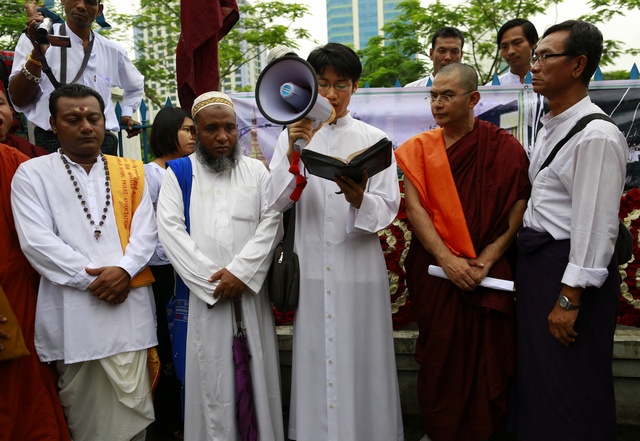Following the Burmese government’s invitation for public opinion on a proposed Religious Conversion Law, 81 organisations from Burma and elsewhere have recommended that it be completely discarded.
In a joint statement published on Thursday, the alliance said the legislation violates the Universal Declaration of Human Rights by granting authorities “sweeping powers” over choice of faith, and called for the Burmese government to “immediately scrap” the law on the grounds that it encroaches on rights and “appears to legitimize the views of those promoting hate-speech and inciting violence against Muslims and other minorities”.
The proposed Religious Conversion Law is part of a package of bills tasked to a drafting committee in March, known collectively as the Race and Religious Protection bills. The bills were originally proposed to Burma’s President Thein Sein in July 2013 by a coalition of nationalist monks affiliated with the government-appointed Maha Nayaka, or National Head Monks Committee.
The package comprises four laws that would impose new regulations on religious conversion, marriage, monogamy and childbearing. The Religious Conversion Law is the only part of the package that has yet been made public; state media published the draft in full on 27 May, soliciting public review and recommendations in the lead up to a parliamentary vote.
[related]
“The only positive aspect of this entire process has been the publication of the draft law and request for comments,” said Phil Robertson, deputy Asia director for Human Rights Watch (HRW), “but we should not get fixated on an issue of procedure when the content of the proposed law is so bad.”
Upon viewing the draft, international observers immediately called foul. Sam Zarifi, Asia Regional Director of the International Commission of Jurists, told DVB that while it’s not rare for a nation to create laws requiring citizens to provide the government with details about their religion, “the draft text itself, to the extent it limits religious proselytisation and conversion, runs afoul of international standards.”
The seven-chapter conversion bill would establish township-level “registration” boards and grant them powers to examine and approve religious conversions. The draft also states that “every person has the freedom to convert”. But opponents argue that the bill creates excessive obstacles to religious choice; those wishing to change their religion must submit an application providing personal details such as family members’ names and faiths, and a reason for conversion. The registration board would then interview the applicant to determine the sincerity of their faith and assess whether the conversion is voluntary.
Those suspected of either coercing someone to convert or applying “with the intent of insulting or destroying a religion” could face up to a two-year prison term, which the rights groups argue “[raises] the prospect of arbitrary arrest and detention for those wishing to convert from Theravada Buddhism – the faith of the majority in Burma/Myanmar – to a minority religion, or no religion at all.”
Thursday’s statement, released by the Chin Human Rights Organisation (CHRO) and endorsed by 80 other rights groups, claims that the “broad wording of this provision may effectively outlaw proselytizing in the country.”
[pullquote] “The broad wording of this provision may effectively outlaw proselytizing in the country.”[/pullquote]
While the law has been criticised as a thinly-veiled attempt to prevent Islamicisation in the context of two years of deadly ethno-religious conflict, the Conversion Law has also raised alarm for Burma’s other religious minorities, notably Christians, many of whom reside in parts of the country that are either still in direct conflict or slowly resolving conflict with the central government.
In Chin, Kachin and Karen states, all of which have large Christian populations, to impose new restrictions on freedom of faith could “seriously undermine the peace process,” said Rachel Fleming, advocacy director for CHRO. “There is a risk that people will view it simply as a continuation of the long-standing ‘Burmanisation’ policy practised under the previous military regime.”
In Chin State, said Fleming, the Conversion Law is particularly threatening because of a clause leaving the definition of “influence” widely open to interpretation. It could, in effect, subject Chin missionaries, who have historically withstood severe religious persecution by the Burmese military, to a year in prison for doing their jobs. Hence, Fleming argued, “this law could result in an increase in the number of prisoners of conscience in Burma’s jails.”
Other bills in the package have received similar scorn; in early May, a group of 97 civil society groups urged the government to abandon the proposed Marriage Law — often referred to as the Interfaith Marriage Act — on the grounds that it violates women’s freedom of choice. HRW went so far as to call it “unconstitutional”. A group of about 15 civil society leaders also met with Aung San Suu Kyi, who chairs the Rule of Law Committee, on Wednesday to register similar complaints.
In a Wednesday press briefing, a US State Department spokesperson said that approving the Marriage Law would be “inconsistent with the government’s efforts to promote tolerance and respect for human rights,” adding that, “more broadly, we continue to have serious concerns about other pending legislation that could have a detrimental effect on religious freedom.”



